Erika Bragdon is a Certified Essential Oil Coach from the Essential Oil Institute.
Seasonal allergies can put a real damper on an otherwise beautiful season, especially if you’re affected by hay fever during the spring or summer. Itchy watery eyes, sneezing, runny nose, sinus irritation, headache, and more can make you feel miserable.
Essential oils may be helpful in relieving the symptoms of allergies naturally. Today I’ll share the best essential oils for seasonal allergies, how they can help, safety tips, which oils blend well with others, plus how and where to apply them.
When I start using essential oils to help my husband and son who both suffer from spring allergies, we were all surprised at how quickly and effectively they helped with their symptoms. I hope you will see relief too. Remember that we are all different and your results may be different from my family’s.
Always use common sense with essential oils, talk with your healthcare providers with any questions or concerns, and remember that essential oils are very potent and you only need a small amount.
There are a variety of ways you can use essential oils, from applying topically in an essential oil blend for allergies, diffusing a blend in the diffuser, inhaling directly from the bottle, or even making a homemade essential oil spray.
Please read my post on essential oil safety before using these or any other essential oils.
The Top 5 Essential Oils for Allergy Relief
So what essential oils are good for allergies? Here are the top 5 essential oils that have worked the best in my experience.
#1 Lavender Essential Oil
Latin name: Lavandula angustifolia
Lavender is one of the safest and most popular essential oils in the world. It has many amazing benefits from soothing dry skin to relieving itchy bug bites.
It is relaxing and may help to calm irritation in the body.
Lavender essential oil blends well with: basil, bergamot, black pepper, cedarwood, eucalyptus, frankincense, holy basil, lemon, manuka, peppermint, roman chamomile, rosemary
Safety: lavender is generally well tolerated for most people.
Buy lavender here.
#2 Lemon essential oil
Latin name: Citrus x limon
Lemon may be helpful with respiratory discomfort, including symptoms related to the sinuses, throat, and nose. It has cleansing properties and may also help with energy and alertness. It’s one of my family’s favorite essential oils for seasonal allergies.
Lemon essential oil blends well with: basil, bergamot, cilantro, eucalyptus, frankincense, ginger, holy basil, lavender, lemon, manuka, peppermint, roman chamomile, rosemary
Safety: Dilute for topical use. May cause increased sensitivity to the sun. Avoid direct sunlight for up to 12 hours after applying lemon to the skin.
Buy lemon here.

#3 Peppermint essential oil
Latin name: Mentha piperita
Peppermint may be helpful for clear breathing and healthy respiratory function, including symptoms related to the sinuses, throat, and nose. It can also be energizing and cooling.
Peppermint essential oil blends well with: basil, bergamot, black pepper, eucalyptus, lavender, lemon, manuka, rosemary
Safety: Dilute for topical use. Some medications may interact with peppermint so check with your doctor. Do not apply on or near the face as it may cause irritation.
Buy peppermint here.
#4 Frankincense essential oil
Latin name: Boswellia sacra
Frankincense is calming and may be helpful for symptoms related to inflammation.
Frankincense essential oil blends well with: bergamot, black pepper, cedarwood, ginger, lavender, lemon, eucalyptus
Safety: Dilute for topical use. Known to have blood thinning effects; if you have any blood clotting issues, do not use until you’ve consulted with a doctor.
Buy frankincense here.
#5 Roman Chamomile essential oil
Latin name: Chamaemelum nobile
Roman Chamomile may help calm irritation and has cleansing properties. It also helps support healthy immune system function
Chamomile essential oil blends well with: bergamot, cedarwood, eucalyptus, lavender, lemon, manuka
Safety: Dilute for topical use. Do not use during pregnancy
Buy roman chamomile here.
More of the Best Essential Oils for Allergies
#6 Eucalyptus essential oil
Latin name: Eucalyptus radiata
Eucalyptus may be helpful in promoting healthy respiratory function, including related to the lungs and sinuses.
Eucalyptus essential oil blends well with: cedarwood, ginger, holy basil, lavender, lemon, manuka, peppermint, roman chamomile, rosemary
Safety: Dilute for topical use and do not apply near young children’s faces
Buy eucalyptus here.
#7 Ginger essential oil
Latin name: Zingiber officinale
Ginger may help calm irritation and support the lungs, sinuses, and nose.
Ginger essential oil blends well with: basil, bergamot, cedarwood, eucalyptus, frankincense, lemon
Safety: Ginger is a hot oil; always dilute well before using topically
Buy ginger here.
#8 Manuka essential oil
Latin name: Leptospermum scoparium
Not to be confused with manuka honey, manuka essential oil can be calming for reactions and may be helpful with symptoms of nasal and sinus irritation.
Manuka essential oil blends well with: basil, bergamot, black pepper, eucalyptus, lavender, lemon, peppermint, roman chamomile, rosemary
Safety: Dilute for topical use. Do not use during pregnancy
Buy manuka here.
#9 Rosemary essential oil
Latin name: Rosmarinus officinalis
Rosemary may help calm irritation, has clearing properties, and can support healthy respiratory function.
Rosemary essential oil blends well with: basil, bergamot, black pepper, cedarwood, eucalyptus, frankincense, holy basil, lavender, lemon, manuka, peppermint
Safety: Dilute for topical use. Use minimally during pregnancy. Do not use if you have high blood pressure or epilepsy.
Buy rosemary here.
#10 Basil essential oil
Latin name: Ocimum basilicum
Basil is cleansing and may help support healthy respiratory function, including the nose and sinuses. It can also promote a sense of mental alertness and reduce anxious feelings
Basil essential oil blends well with: bergamot, black pepper, cedarwood, cilantro, ginger, lavender, lemon, manuka, peppermint, rosemary
Safety: Dilute for topical use. Do not use during pregnancy, avoid if you have epilepsy.
Buy basil here.
#11 Holy Basil essential oil
Latin name: Ocimum sanctum
Holy Basil is different from the regular basil listed above and has its own unique properties and benefits.
When it comes to seasonal allergies, Holy Basil can be helpful for respiratory function, particularly related to the nose and sinuses. It is also an adaptogen oil, meaning it may help calm or energize depending on what the body needs.
Holy Basil essential oil blends well with: bergamot, eucalyptus, lavender, lemon, rosemary
Safety: Dilute for topical use. Avoid if you have blood clotting issues or impaired liver function due to the high eugenol (natural chemical compound) found in this oil
Buy holy basil here.
#12 Cedarwood essential oil
Latin name: Cedrus atlantica
Cedarwood is helpful for supporting healthy respiratory function, including the lungs, throat, and sinuses. It also has calming and grounding properties and as an added bonus, may help repel insects. LINK
Cedarwood essential oil blends well with: basil, bergamot, eucalyptus, frankincense, ginger, lavender, roman chamomile, rosemary
Safety: Dilute for topical use. Do not use during pregnancy.
Buy cedarwood here.
#13 Bergamot essential oil
Latin name: Citrus bergamia
Bergamot may help with cleansing and healthy respiratory function. It also has calming and grounding properties, making it a great oil to choose if you’re feeling tense.
Bergamot essential oil blends well with: basil, cedarwood, cilantro, ginger, frankincense, holy basil, lavender, lemon, manuka, peppermint, roman chamomile, rosemary
Safety: Dilute for topical use. May cause increased sensitivity to the sun. Avoid direct sunlight for up to 12 hours after applying lemon to the skin. May affect blood sugar levels; speak to your medical provider if you have diabetes before using.
Buy bergamot here.
#14 Cilantro essential oil
Latin name: Coriandrum sativum
Cilantro is helpful for cleansing and detoxing as it supports healthy liver function. Cleanses may help contribute to reduced irritation to allergens.
Cilantro essential oil blends well with: basil, bergamot, black pepper, lemon
Safety: Dilute for topical use.
Buy cilantro here.
#15 Black Pepper essential oil
Latin name: Piper nigrum
Black pepper helps support a healthy respiratory system and may help balance and clear. It’s also a great oil to help you “get up and go” if you’re feeling sluggish and may help relieve tense feelings.
Black pepper essential oil blends well with: basil, cilantro, frankincense, lavender, manuka, peppermint, rosemary
Safety: Dilute for topical use.
Buy black pepper here.
How to Use Essential Oils for Allergies:
There are three common methods for using essential oils.
1. diffuse with a diffuser
2. applying the oils topically (on your skin)
3. opening the cap and smelling the essential oil directly from the bottle
There are more methods, but those three are the most common and simplest methods.
Diffusing Essential Oils for Allergies
If you want to add essential oils for allergies to your diffuser, here is one simple recipe:
2 drops lavender essential oil
2 drops lemon essential oil
1 drop peppermint essential oil
Diffuse as needed. Breathe deeply closer to the diffuser if your allergy symptoms are bad.
Topical Essential Oils for Seasonal Allergies
Always dilute essential oils with a carrier oil before using them topically (on your skin). This is because essential oils are very potent and one drop goes a long way.
If you decide to use essential oils with your children, you will want to dilute even more for safety.
My favorite carrier oil for diluting essential oils is fractionated coconut oil. You can find it on Amazon, Rocky Mountain Oils, Eden’s Garden, or at other stores/online.
There are a couple of different ways you can use essential oils topically to help with allergy symptoms.
Where to Apply Essential Oils:
One way is to put a small amount of carrier oil in your hand then add 1-2 drops of an essential oil. Rub your hands together, then you can breathe the scent in.
Or apply the oils topically on:
- the back of the spine
- wrists
- upper chest
- back of the neck
- temples &/or forehead (avoid this for children and use caution with stronger oils like peppermint and eucalyptus)
- bottoms of the feet*
*this uses reflexology and is one of my favorite methods for topical essential oil application because it really helps distribute the oils around the body well.
Here is a reflexology chart to help you determine the best places to apply on your foot. For example, if your sinuses are an issue, you can apply the oil on the bottom of your middle toes.
You can also make up a DIY essential oil recipe for seasonal allergies using a roller bottle. These are inexpensive, very easy to make, more convenient, and less messy than rubbing carrier oil and essential oils together in your hands. I have 4 different essential oil roller recipes for allergies here.
You can buy roller bottles here: Amazon | Eden’s Garden
Check out these colorful round labels from Eden’s Garden.
For the best results, use essential oils 2-3 times a day, more if you are experiencing particularly challenging symptoms.
Which Essential Oil Brand is Best?
For the best results, you will want to choose a high-quality essential oil brand that is 100% pure and offers third-party testing for quality control.
My favorite essential oil company is Rocky Mountain Oils, followed by Eden’s Garden, and Ancient Apothecary by Dr. Axe.
You can find those oils here:
- Rocky Mountain Oils – buy here and get free shipping on any order
- Eden’s Garden – buy here and get free shipping on any order OR order through Amazon
- Ancient Apothecary by Dr. Axe – you can order directly from his website or through Amazon
I hope you’ve found this post on essential oils for allergy symptoms helpful. Let me know how these oils work for you in the comments below.
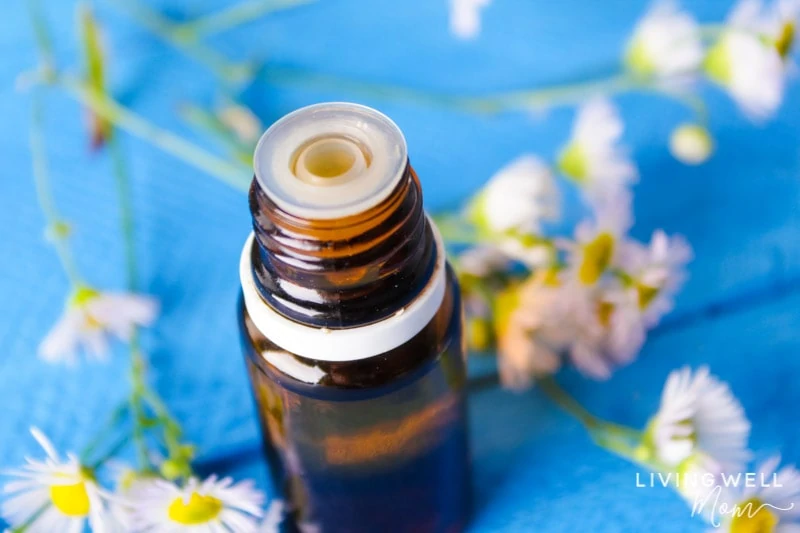
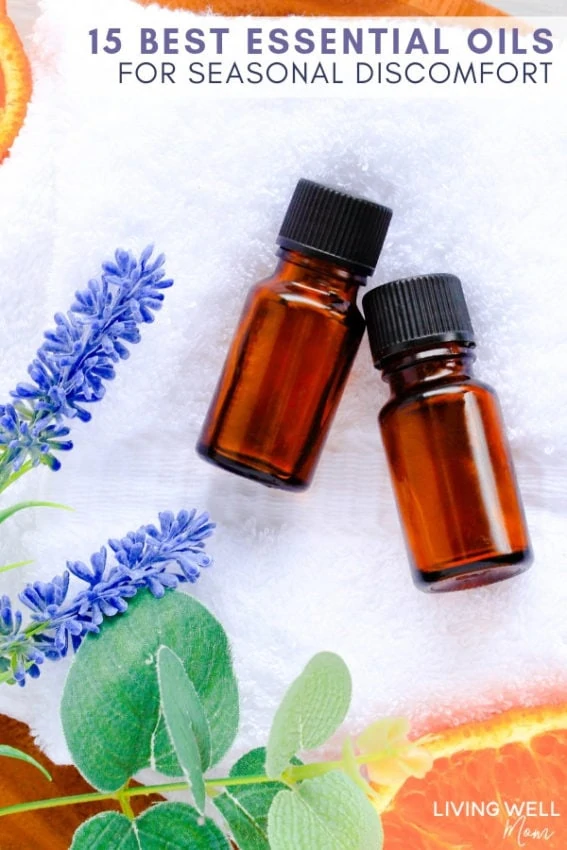
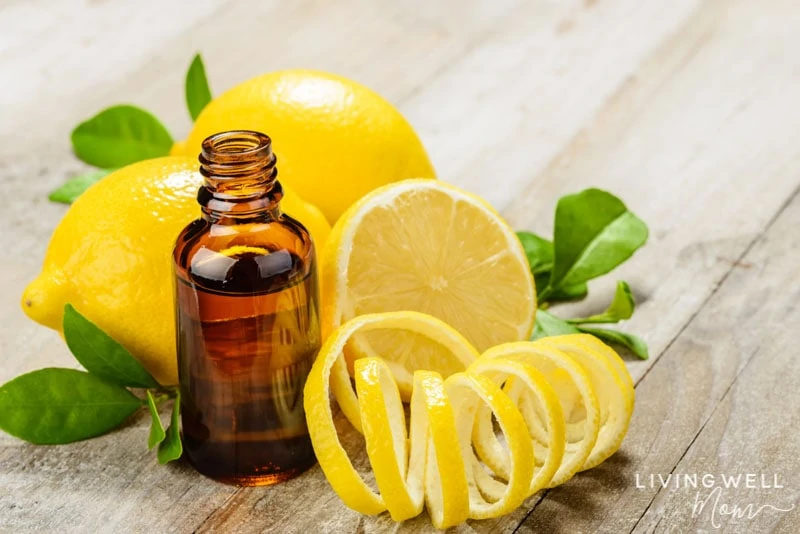
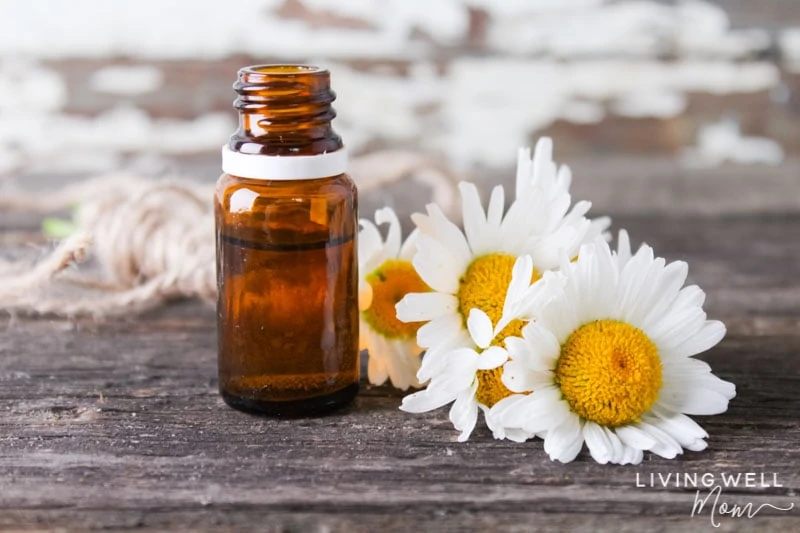
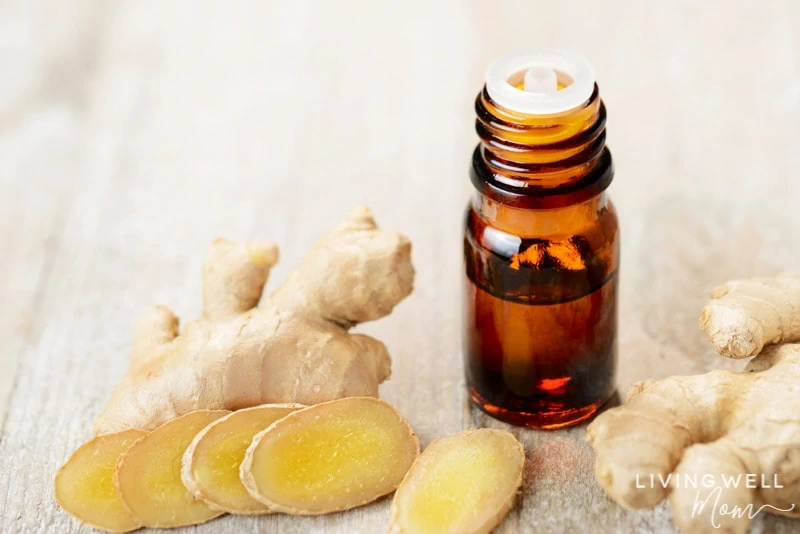
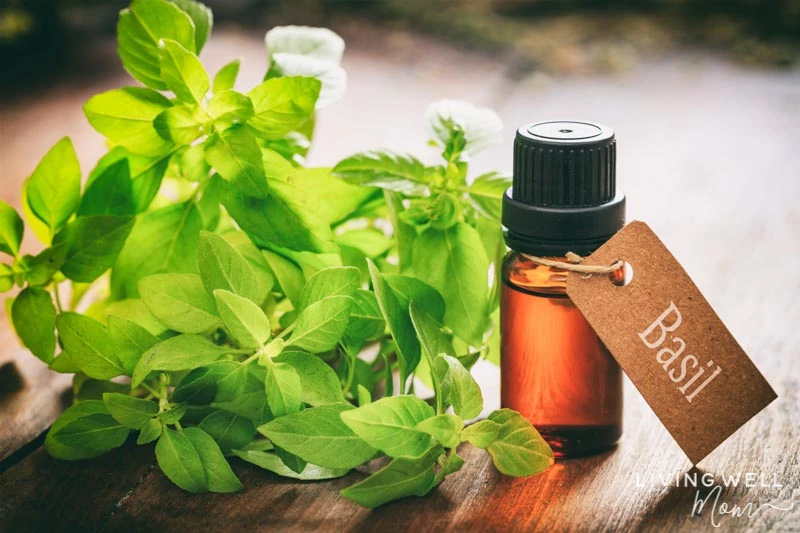
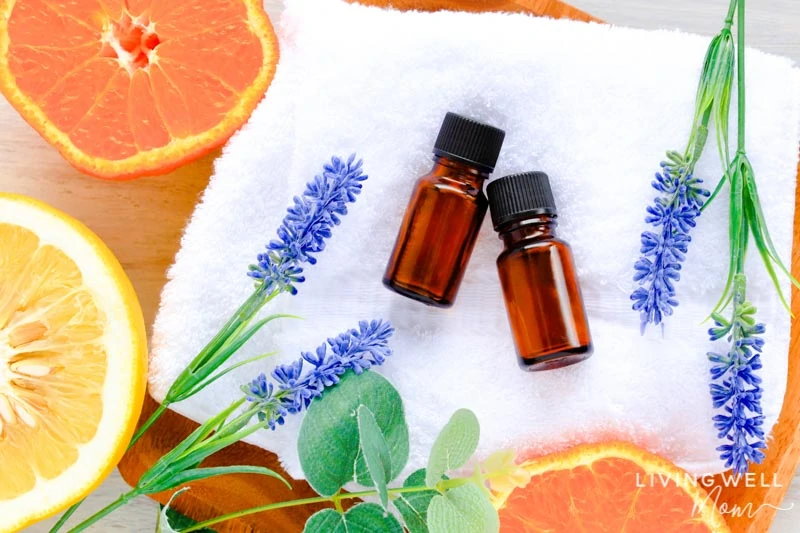
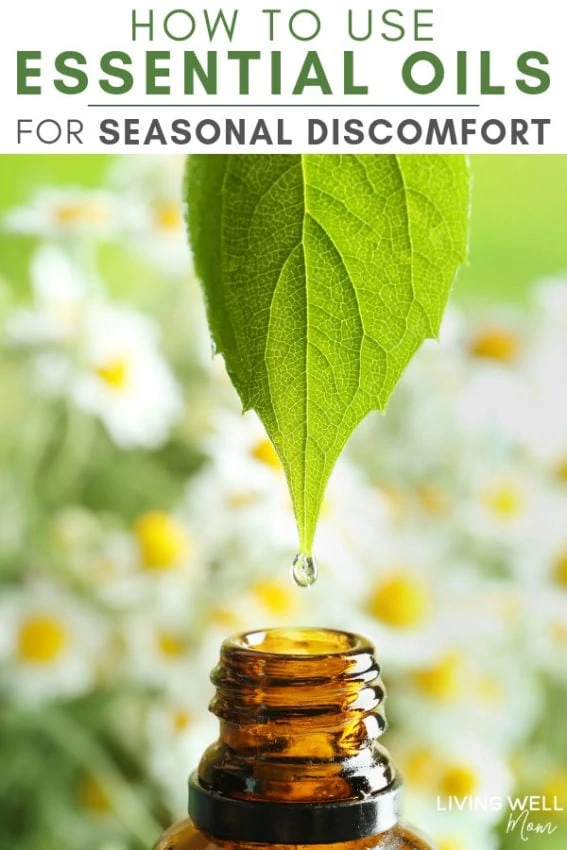
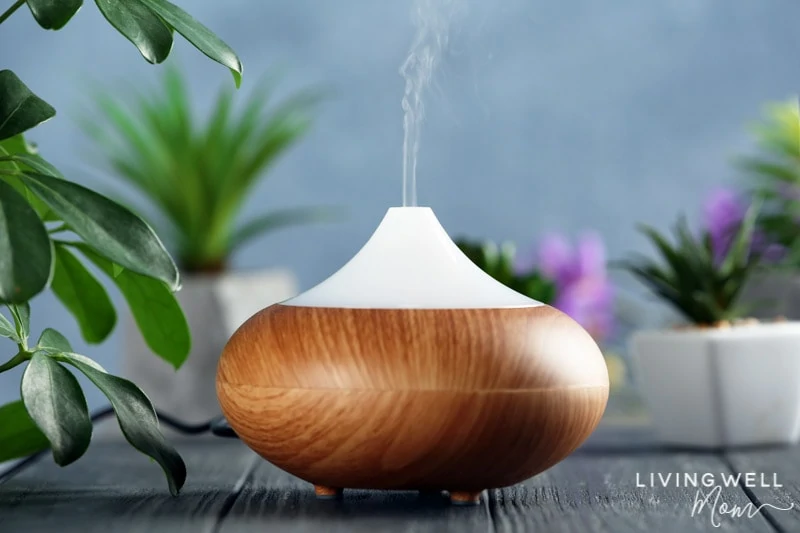

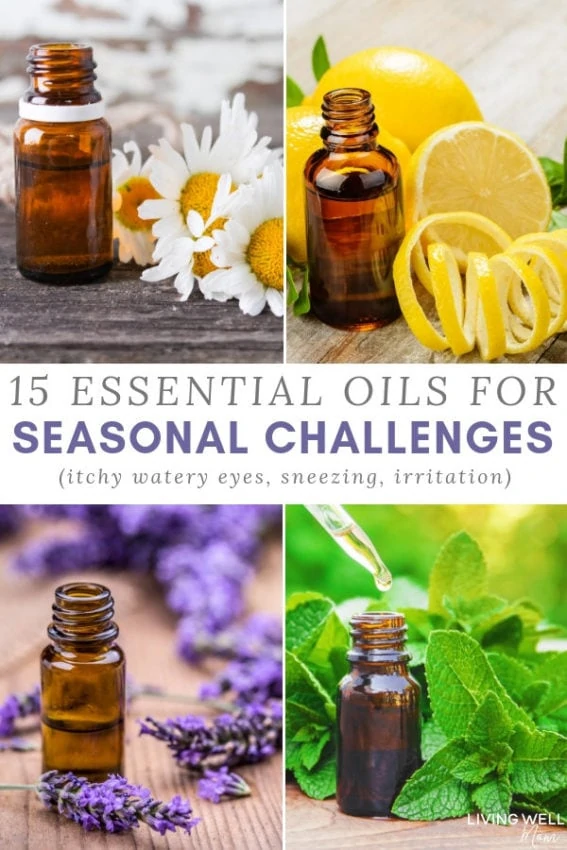
Jamesa says
I’m curious if certain oils would be good for treating atopic dermatitis, and the be a t way to use them.
Erika says
Hi Jamesa, I have a couple posts on essential oils for skincare with more info. I don’t mention eczema specifically as I plan to write a post just for that later but you can find those here: https://livingwellmom.com/best-essential-oils-for-acne/ and here: https://livingwellmom.com/best-essential-oils-dry-skin/ – My son has eczema and we have found that manuka, geranium, and bergamot work very well.